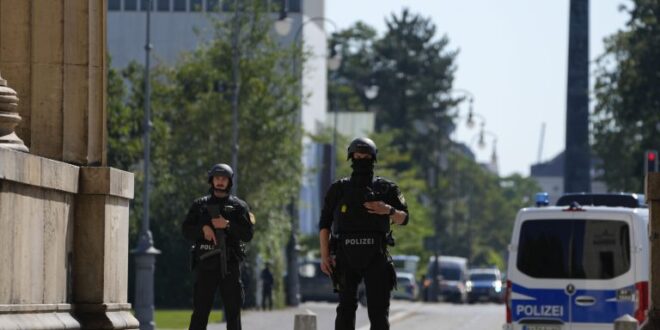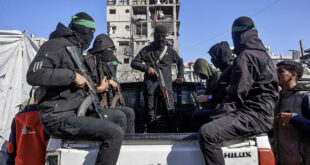Germany is experiencing an uptick in Islamic State (IS) and Islamic State-Khorasan (IS-K) incidents and is increasingly the target for jihadists and IS’s propaganda.
The target selection and date of the September 5 shooting in Munich fits within the post-October 7 trend of Islamic State leveraging hostile sentiments from the conflict in Gaza to mobilize its supporters.
Islamic State and Islamic State Khorasan (IS-K) intensified their focus on Germany following the March 22 Moscow attack to capitalize on momentum through a campaign urging attacks against sporting events in Germany and elsewhere in the West.
In response to the surge in Islamic State and Islamic State Khorasan activity, Germany is implementing a host of new policies and measures to address the growing threat.
On September 5, an 18-year-old Austrian national wielding a rifle was killed while attempting to conduct an attack near a museum and the Israeli Consulate in Munich. Investigators say the suspect was previously known to law enforcement for terrorism links and was subject to a weapons ban. The shooting took place on the 52nd anniversary of the attack by Palestinian militants against Israelis at the 1972 Munich Olympics. The symbolism is notable as the West — and Europe in particular — has seen a surge in jihadist activity since the October 7 Hamas assault and the subsequent conflict with Israel. The following day after the recent Munich attack, a 29-year-old Albanian citizen went to a police station in the German town of Linz am Rhein and shouted “Allahu Akbar” while vocalizing his intent to kill law enforcement officers. It was reported that investigators found a flag used by Islamic State (IS) drawn on the wall of his apartment.
These incidents occurred on the heels of an editorial featured in IS’s weekly al-Naba newsletter celebrating the August 23 knife attack in Solingen, Germany, and encouraging more violent action in the West. This stabbing happened at an event celebrating the city’s founding and resulted in at least three dead and eight injured. IS’s Amaq news agency deemed the perpetrator a “soldier of the Islamic State” who was targeting Christians “to avenge Muslims in Palestine and everywhere.”
This framing is crucial to understanding the resurgent Islamic State threat to Europe, as the organization’s post-October 7 strategy to tap into hostile sentiments stirred up by the Israel-Hamas war has found significant traction. This success was observable almost immediately after Hamas’ terrorist attack and Israel’s subsequent military response as multiple IS-related incidents occurred across Europe the following week, including an October 13 stabbing committed by a 20-year-old man at a school in Arras, France, and an October 16 shooting by a 45-year-old man against Swedish soccer fans in Brussels, Belgium. Since then, attacks inspired by IS, grounded in grievances about the Israel-Hamas war, have been carried out in Switzerland and Australia, while a spate of associated plots have been foiled throughout the broader West.
Shortly after the war kicked off last October, IS published an editorial in its weekly al-Naba newsletter titled “Practical Steps to Fight the Jews” in which it urged supporters to “target the Jewish presence throughout the world, whatever the form of this presence, especially the Jewish neighborhoods in America and Europe,” also adding Israeli embassies. Reminiscent of former Islamic State strategist and chief propagandist Abu Muhammad al-Adnani when he urged IS supporters to launch attacks with whatever means were at an individual’s disposal, whether a car or a rock, the article encouraged sympathizers to “arm themselves with whatever military equipment is available to them, especially the explosive belts that were absent from the arena of confrontation with the Jews.” IS Khorasan (IS-K), which was deemed Germany’s most significant security threat by Interior Minister Nancy Faeser in March, translated the article into English and disseminated its own tactical advice poster titled “Practical Ways to Confront the Jew,” suggesting followers in the West attack popular tourist sites, educational institutions, and concerts.
Germany was likewise emphasized as a priority target by IS-K and its pro-IS propaganda production partners in capitalizing on the momentum and global attention spurred by the March 22 attack on Moscow’s Crocus City Hall venue. IS-K published a full-page image in its magazine showing one of its militants aboard a train with a rifle and a box of explosives, standing in front of a sign that reads “Welcome to Europe” and is captioned “Last Call Before Exit.”
A strategic campaign was launched specifically promoting violent acts against sporting events, with the European Cup in Germany among the top targets, alongside the Paris Summer Olympics. In May, IS-K threatened attacks on stadiums in Berlin, Dortmund, and Munich in its flagship Voice of Khorasan magazine. In June, an individual who was linked to IS-K and had attempted to secure employment at events during the Euro 2024 tournament was arrested at the Cologne airport.
IS-K and its supporters have been operationally active inside Germany since at least 2020, when four Tajik nationals who were communicating with IS members in Afghanistan and Syria were arrested for planning attacks on U.S. military bases in Germany. In July 2023, an IS-K network in Germany and the Netherlands was rolled up, and in December of the same year, a network of Central Asians was arrested in Germany and Austria for plotting attacks during the Christmas and New Year’s season. In March 2024, German security forces arrested two men linked to IS-K who had been preparing an operation against the Swedish parliament in Stockholm. Additional IS-K activity has been recorded in France, Belgium, and Austria.
IS has historically perceived opportunities to launch attacks in Germany given its considerable Muslim population, one of the largest amongst European countries. Despite the resurgence, Islamic State’s threat to Germany is not a new phenomenon. Germany became a greater priority for IS after it joined the coalition against the organization in December 2015, essentially announced as a response to the Paris attacks the month before. In the months and years following, Germany suffered a series of IS-influenced attacks, most notably the December 2016 Berlin vehicle ramming that killed at least 13 people and injured over 50 others. In response to the threat, Germany is enacting new policies including the strengthening of border security, extending temporary checks, stricter deportation measures, and facial recognition of criminals. Moreover, other potential policies are currently being mulled such as the ability to break into residences during counterterrorism investigations.
These policies demonstrate the sense of urgency which Germany is adopting to address the reinvigorated jihadist threat. However, this will prove difficult since IS and IS-K will continue to aggressively target Germany while looking to exploit intelligence and security gaps given Berlin’s overstretched bandwidth resulting from espionage and sabotage by Russia, Iran, and China, as well as challenges presented by domestic right and left-wing violent extremists.
 Eurasia Press & News
Eurasia Press & News




